The Anfal operations 1988
Under the code-word "Anfal"- (title of a Quran sura, literally "the spoils") - the Iraqi Ba'ath-regime conducted a vast
military operation against large parts of the rural areas in the Kurdish North of Iraq in 1988. Within a few months,
thousands of Kurdish villages were destroyed, the population concentrated under army control; up to 182 000 young men
and women were separated from their families and were deported and murdered.
The individual fate of most of them remains unclear
until today.
Elders and women with children were detained and tormented for months; daily dozens of them died from hunger and exhaustion
in the notorious prisons of Dibs and Nugra Salman in South Iraq.
In September 1988 the survivors were released and forcibly resettled in so called "collective towns" under military control.
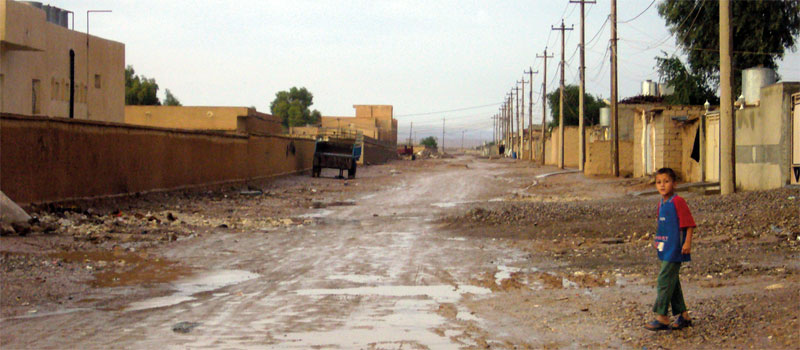 Street in the former
resettlement camp of Sumud, today renamed Rizgary
Street in the former
resettlement camp of Sumud, today renamed Rizgary
Surviving after Anfal
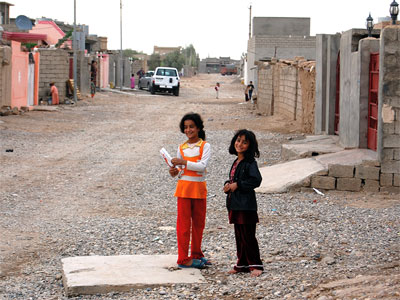 Children in the former
resettlement camp of Sumud, today renamed Rizgary
After the Kurdish region achieved de facto autonomy in 1991, the reconstruction of the destroyed villages began. Yet many
of the Anfal survivors, and especially women with children, remained in the collective towns, living amidst uncertainty
and material hardship. Their suffering, after the violence and loss they had experienced, was prolonged by uncertainty
on the fate of their deported loved ones. In addition, precarious economic circumstances and the women's unclear social
and legal status in a traditional patriarchal environment, that did not provide any life concept for a woman without male
bread winner, prevented them from developing new life perspectives. Yet despite all constraints women Anfal survivors
mobilized enormous energies, did all kinds of hard work and developed strong collective structures to survive and raise
their often numerous children.
Children in the former
resettlement camp of Sumud, today renamed Rizgary
After the Kurdish region achieved de facto autonomy in 1991, the reconstruction of the destroyed villages began. Yet many
of the Anfal survivors, and especially women with children, remained in the collective towns, living amidst uncertainty
and material hardship. Their suffering, after the violence and loss they had experienced, was prolonged by uncertainty
on the fate of their deported loved ones. In addition, precarious economic circumstances and the women's unclear social
and legal status in a traditional patriarchal environment, that did not provide any life concept for a woman without male
bread winner, prevented them from developing new life perspectives. Yet despite all constraints women Anfal survivors
mobilized enormous energies, did all kinds of hard work and developed strong collective structures to survive and raise
their often numerous children.
After the fall of the Ba'ath-regime in 2003, women Anfal survivors' situation changed. More than 300 mass graves were
discovered throughout Iraq; only a small number has been opened and the victims identified to this day.
Thus uncertainty continues. Yet safety from the aggressor, the sentencing of the main perpetrators by the
Iraqi High tribunal and economic and political stabilization of the Kurdish region have contributed to significantly
improve the circumstances and the psychosocial situation of Anfal survivors. The Kurdistan Regional Government granted
Anfal survivors pensions and housing and invested in the Anfal affected regions' infrastructure. Today women Anfal
survivors and their meanwhile grown-up sons and daughters reconstruct their families and social networks.
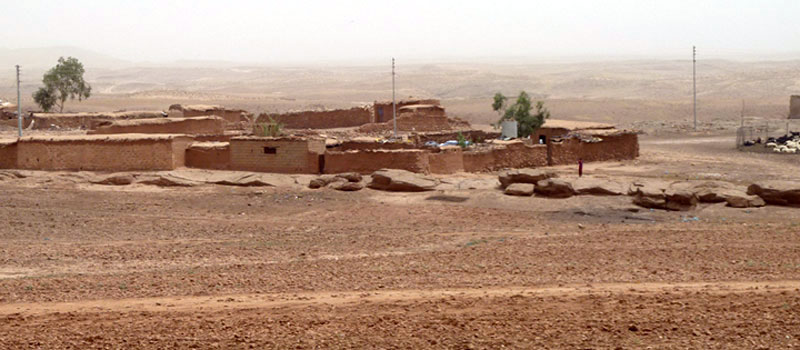 Village in the
Germyan Region
Village in the
Germyan Region
With the end of uncertainty and survival struggle, the women discovered their strength and survivors' pride and today
clearly articulate their political claims towards the Kurdistan Regional Government, the Iraqi Government and the
international community:
- The rapid opening of the mass graves and identification and reburial of the Anfal victims
- The punishment of further perpetrators including the Kurdish collaborators involved in the Anfal operations
- Compensation by the Iraqi government
- Societal and political acknowledgement of the specific experience of violence and loss
- International acknowledgement of Anfal as genocide
The legacy of the Ba'ath-regime
Ongoing violence in Iraq, and the increasing fragmentation of Iraqi society along ethno-religious lines, delay and impede
the process of dealing with the past on a regional and national level.
For all the different ethnic, religious, and political factions, past victimhood and current patterns of violence are
central to legitimating sectarian claims for power sharing on a national level. Victims of violence, past and present,
are often played off against each other, and receive insufficient assistance from the authorities. Throughout Iraq,
survivors of violence and relatives of victims feel marginalized and alienated from the political process. The absence
of a meaningful debate about the past only deepens the political, ethnic, and religious conflicts in Iraq.
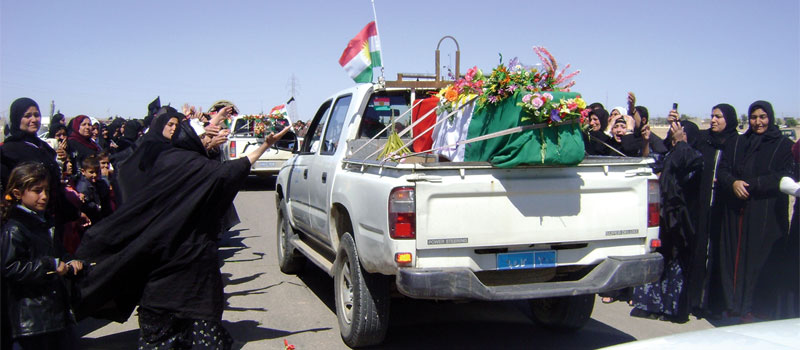 Reburial of Anfal
victims in Rizgary , April 2009
Reburial of Anfal
victims in Rizgary , April 2009
The Kurdish national victimhood discourse
In the Kurdish regional debate the Anfal operations are considered a "collective trauma", constituent for the Kurdish
national identity and central for legitimating Kurdish claims to autonomy and national power sharing. In this discourse,
women Anfal survivors are represented as passive victims and symbols of national suffering. Their concrete experience,
testimonies and claims remain excluded from the public debate as well as their strong collective structures, that have
helped them to survive during and after Anfal.
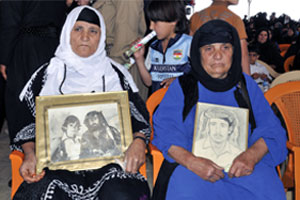 Women Anfal
survivors at remembrance ceremony 25th anniversary of Anfal, Rizgary, April 2013
Women Anfal
survivors at remembrance ceremony 25th anniversary of Anfal, Rizgary, April 2013
In this context the memorial forum initiative in Rizgary is the first women self help group that specifically engages for
empowerment and political participation of women Anfal survivors.
Enfal - Haukari e.V., 2006
Read more:
Karin Mlodoch: "We Want to be Remembered as Strong Women, Not as Shepherds": Women Anfal Survivors in Kurdistan-Iraq
Struggling for Agency and Acknowledgement in:
Journal of Middle Eastern Women's Studies, Volume 8, Number 1 (Winter 2012)
(gegen Bezahlung)
Karin Mlodoch: "Vergangenheitsbewältigung im Irak" - aus: Politik und Zeitgeschichte, 9/2011, 28.02.2011